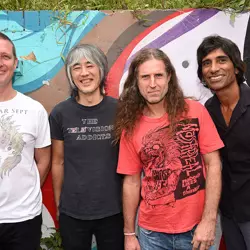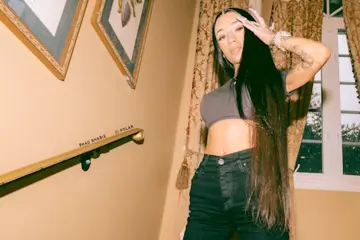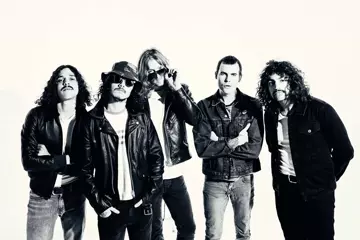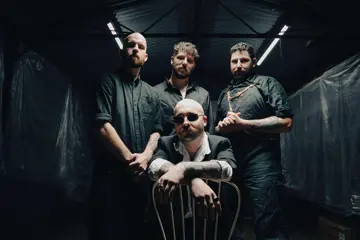 Hard-Ons
Hard-OnsThe D4 are heading to Australia this month, taking to the East Coast with a loud, wild, and combustible set.
With the tour, they’ll be bringing along the first-ever vinyl pressing of their second album, Out Of My Head, to our shores. The New Zealand rockers have prepared a “sonic assault” for their fans – not just of their own music, but with some of Australia’s finest punk and rock outfits joining them on tour.
One of those bands is Hard-Ons, opening for The D4 in Sydney. To celebrate their upcoming tour, The D4’s Dion Lunadon and Hard-Ons’ Ray Ahn have gone head-to-head in a meeting of the rock and roll minds, discussing the “raw energy” of punk for The Music.
When did you guys first meet and first play together?
Ray: The Hard-Ons have never played with The D4, but we know The D4 well because I was in a band called The Stalkers at one stage with a couple of the guys out of Regurgitator, and we toured with D4. We know The D4 guys because we met them when we went to NZ, we’d see Jimmy [Christmas] and Dion around all the time.
Dion: And I think on one of our earlier tours, we played with Nunchukka Superfly.
Ray: We also know about D4 because a lot of our friends would always talk about you guys.
Can you guys speak about your experience with the live rock ‘n’ roll scene today compared to 20 years ago?
Ray: I come from an era of Australian pub rock, so my understanding of playing in a band was based on that: you basically went out on the road and played four nights a week for the whole year and then put out one album a year, it was highly intensive, but everyone made money from it. I think at that time, people really loved live music, but I think the problem with rock ‘n’ roll music is that you can’t really put a value on it.
Don't miss a beat with our FREE daily newsletter
Most people don’t see how much work goes into learning an instrument, going to band practice or moving gear. Say someone walks into a pub to fix the toilet or connect the electricity. They have a price, but no one pays the bands what they’re really worth, so all they see is three or four guys on stage; it’s so subjective. We can agree the paint peeled off after a week - you didn’t do a good job. bands get judged on how many people they pull, but that’s not a good way to judge a band.
In Australia, we’ve got triple j. They market themselves as a youth network, and they’ll have a Hottest 100 competition, but it was never meant to be a competition; it’s art. But that’s the problem with art: you can’t put a dollar value on it. There will be times when bands are packing out venues, and there’s a lot of money to be made, but the moment times are tough, nobody comes to the band’s rescue.
I think the industry should be forced to look at the effort that’s gone in, force them to think about how hard it is to form a band, play music, get good at your instruments – make them see it somehow and then put a decent value on it, then fund the arts and every band gets a minimum wage. – Ray Ahn
Ray: Dion, I don’t have to tell you, you’ve played in Europe, when you go to The Netherlands the city council pays rent and salary when bands go on tour, it gets paid through tax.
Dion: Same in France, you play a venue, and the government arts department subsidises the venue to pay the acts a decent fee.
Ray: Music and Art isn’t valued, but it’s always been that way, it didn’t bother me when I was a teenager playing music, I knew I would get paid and knew the shows would be crowded as that’s what people did back then. At the time, there was enough money to go around, but after all those years of taking bands for granted, taking rock ‘n’ roll for granted, now you’ve got things like Spotify, where artists don’t really get paid.
Dion mentioned The Victims’ Television Addict as one of his top tracks of all time in a recent interview. Dion, can you speak about what you love about this record and Ray, your experience playing with the band?
Dion: I like the rawness of it; it’s just one of those songs that was captured right, the delivery of it all was delivered in the right way, it’s got that energy that punk requires, you can play it to anyone who’s into that kind of music and they’ll be like, “This is great”.
Ray: It’s still surreal playing it live; it feels like I’m a fan who’s jumped on stage with them, but I’ve known Dave [Flick] and James [Baker] for about 43 years or something; I’ve known them since I was at school. I knew them from the early days of the Hoodoo Gurus, and we’d see them in small places. When I was in high school, Blackie got the Victims single. I thought, ‘I need to get this from somewhere.’
So, they had two records out: Two 7-inches, Television Addict and the second EP, which is just as good, and I went into the record shop in the city that was selling import records. I got there Saturday morning, and they weren’t open, so I was banging on the door. Frank, who was working there, said, “Yeah, we’ve got them, but we’re going to auction them off”.
And I said, “No, I’ve come all this way; you need to sell them to me”, so he sold them to me for ten dollars each, and that was 1981. To this day, I see Frank, and we still talk about it because those records are worth a few thousand dollars each now.
Ray: When James and Dave wanted to re-form the Victims, James told me that there was no other person they were going to ask. When they asked me, I was like, “Wow, this is really crazy.” Because they were my childhood hero band, all those gigs and shows were fantastic.
I talked to Dave and James about it. They both agreed something magic happened with the Television Addict recording they could never capture again, and they both agreed they should have done a whole album when they were in the studio recording it because they were on some kind of roll. The magic was still there when they reformed, and I helped them out on the bass, and it was a real honour for me.
Dion: That’s so cool. It’s like what happened to me with The Scavengers asking me to play bass and sing with them, they’re a legendary NZ punk band I looked up to and The D4 covered one of their songs on our first record.
Ray: What an honour, a great New Zealand legendary punk band.
Ray: So, you live in the States. Do you make a living as a full-time musician there?
Dion: I do; it can be a struggle; when The D4 called it quits, I moved to the States about a month later with nothing other than my guitars. It’s up and down, now it’s pretty damn tough, I feel a bit of an upswing because I’ve got the band who’s been touring a lot in Europe and word is spreading. I DJ a lot; I give lessons here and there. I just hustle, and I do this as much as I can.
Ray: Yeah, it’s wild. From the first ten years of The Hard-Ons, I went straight from high school to the band, and I didn’t really need to have a job until we broke up in 1993, so we went from 1983 to 1993 we were able to make money from The Hard-Ons so there were so many places to play, we just played non-stop. We broke up, and when we came back, we couldn’t give up our day jobs.
In terms of major label experiences? Can you speak about your experiences and how it compares with being independent.
Dion: I’ve had good and bad experiences with major labels; I don’t think I’d be on one again. I feel like when D4 were signed to Hollywood Records, they put a lot of time, money and effort into the band. I was pretty surprised about the job they were doing; they were doing a pretty damn good job; we were on like seven talk shows in the US, we’d turn up to venues, and they’d be posters for the record everywhere, the venues were packed – it was a well-oiled machine, but there was also some stupid money spent on stupid things. Going back, I would have put that money in my pocket and saved it for a rainy day.
Dion: The counter side to that is things were going well, and then we re-recorded a song for a lot of money, it was such a stupid idea, and the song ended up sounding like dogshit. And they went to take it to the radio, things were going well on the radio, the radio didn’t pick up the song and that was the end of our career.
Someone once told me that I should just concentrate on the music and not worry about the other stuff. That was the worst advice I had ever received. I think you keep an eye on your own shit, the money, the workings of your band. That’s what we did when we first started, and then we relinquished that to managers and others too much. When things turned around, we couldn’t get a phone call back from these people.
I’m a firm believer in doing as much yourself as you can and doing it for the love of the game. I love rock ‘n’ roll and that’s why I do it, I try and make music that I would listen to, end of story. – Dion Lunadon
I’m not really interested in what other people think about my music. Sure, it’s great when people like it, but I make it for my own satisfaction, and I’m also a firm believer in touring and selling records at my shows. I like getting straight to the people, and if someone sees my band, if my band is any good, then word will spread. If my band is not good, then word won’t spread, and they won’t come next time.
Touring has worked for every single band I’ve been in, The D4, A Place To Bury Strangers, Dion Lunadon, I’m a firm believer.
Ray: I asked Rob Younger from Radio Birdman a long time ago when the Hard-Ons first started, and Radio Birdman were, like, a legendary band. He started playing live back in the mid-70s, I said “Rob what’s the difference between now and the mid-70s?” And he said, “Absolutely nothing.” He said, “Nothing’s changed, you’ve got good bands, and you’ve got shit bands”. I said, “Do you think Hard-Ons are a good band? And he said, “Do you think you’re a good band?” I said, “Yeah”. He said, ”Well, you’re a good band”.
Look, I’m going to be sixty in June, so I don’t know if there’s a market for a pensioner Asian guy in a punk band. I don’t have Pitchfork media coming to do an interview with me, so a lot of times, the only thing I’m interested in is the gap between the kick drum and the snare drum; that’s all I care about, and that’s the only thing I can have control over.
Ray: There’s a lot of great things about not being the flavour of the month. When The Hard-Ons first started, people were saying things like if you had a guy up the front like the Ramones rather than a singing drummer, you’d be more marketable, and I would say to them, ‘The band is called The Hard-Ons, you idiots. Do you think we’re heading straight to the top anyway? We’re here for the music.’
I still think the great thing about playing in a band that not many people care about is you’ve got all this freedom to do what you want. Freedom is great; I mean, we were doing really, really well going to America, going to Europe all the time and then all of a sudden, it was obvious that there were a lot of major labels asking to sign us and our record label at the time, Waterfront Records, which was a small indie label thought we were going to leave them. We were being offered a lot of money so what the label said is, we will get a deal with a major distribution company, they went with Festival.
That coincided with Nirvana getting popular, and suddenly, underground music was big, and then the band felt pressure to go to the next level. I remember so many people had vested interests in the band becoming successful. That’s why we broke up, because all of a sudden, we went straight from a high school garage band that had gone feral, and then we were told, “You’re a professional band, and all these bands are getting signed, and you’ve got major label distribution, you need to deliver an album that’s going to be making you household names” And I’m going, household names? We’re called The Hard-Ons.
We broke up because the pressure was awful, when we reformed in 1998, we just wanted to do all the things that were our dreams, we made a record with Ed Kuepper of the Saints, and we wanted to go back to Europe straight away. We decided we’re not full-time musicians so we don’t have the pressure to go and sing for our supper, we decided we’d get jobs where we could still leave and go on tour for two months and come back.
You guys are playing on Valentine’s Day in Sydney. It’s the first time you are playing together; what can we expect? Is there going to be love in the air? What’s going to go down?
Ray: I think the crowd is going to be deafened because the last time I saw The D4, I couldn’t hear for a whole fucking week. That was fantastic, that was the night you climbed the PA, Dion, with your Gibson in your arms, I couldn’t believe it.
Dion: I’m looking forward to it; I’m looking forward to seeing you, Ray.
Ray: Likewise, Dion, it’s been 20 years.
Dion: And I’m looking forward to coming to Sydney for the first time in 20 years, we’re going to bring a whole bunch of merch too, we made lathe cut 7 inch, only 30 copies, we’ve got two albums, I’m going to bring some of my solo albums.
The D4 and Hard-Ons will perform in Sydney this Friday. You can find all the tour dates below.
RETURN OF THE D4
2025 AUSTRALIAN TOUR
WITH SPECIAL GUESTS
Thursday 13 February – The Brightside, Brisbane – Tickets
With Tape/Off and Gentle Ben And His Shimmering Hands
Friday 14 February – Mary’s Underground, Sydney – Tickets
With Hard-Ons and Finnoguns Wake
Saturday 15 February – The Tote, Melbourne – Tickets
With Mach Pelican, Raging Hormones and The Stripp
















